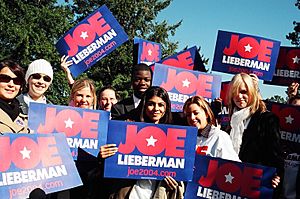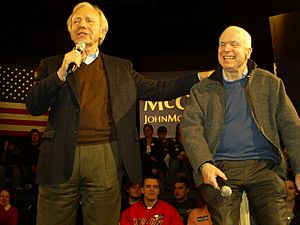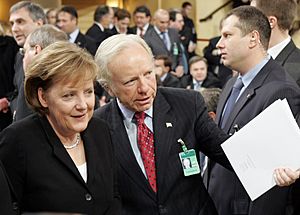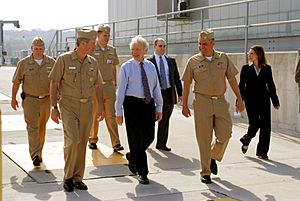Joe Lieberman facts for kids
Quick facts for kids
Joe Lieberman
|
|
|---|---|
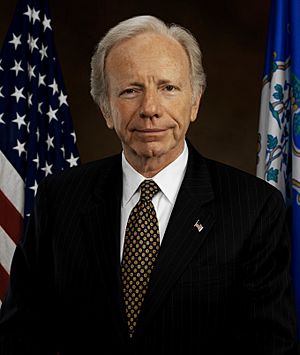
Official portrait, 2005
|
|
| United States Senator from Connecticut |
|
| In office January 3, 1989 – January 3, 2013 |
|
| Preceded by | Lowell Weicker |
| Succeeded by | Chris Murphy |
| Chair of the Senate Homeland Security and Governmental Affairs Committee | |
| In office January 3, 2007 – January 3, 2013 |
|
| Preceded by | Susan Collins |
| Succeeded by | Tom Carper |
| In office June 6, 2001 – January 3, 2003 |
|
| Preceded by | Fred Thompson |
| Succeeded by | Susan Collins |
| In office January 3, 2001 – January 20, 2001 |
|
| Preceded by | Fred Thompson |
| Succeeded by | Fred Thompson |
| 21st Attorney General of Connecticut | |
| In office January 5, 1983 – January 3, 1989 |
|
| Governor | William O'Neill |
| Preceded by | Carl R. Ajello |
| Succeeded by | Clarine Nardi Riddle |
| Member of the Connecticut State Senate | |
| In office January 1971 – January 1981 |
|
| Preceded by | Edward Marcus |
| Succeeded by | John Daniels |
| Constituency | 11th district (1971–1973) 10th district (1973–1981) |
| Personal details | |
| Born |
Joseph Isadore Lieberman
February 24, 1942 Stamford, Connecticut, U.S. |
| Died | March 27, 2024 (aged 82) New York City, U.S. |
| Political party | Democratic (before 2006; after 2013) Independent (2006–c. 2013) |
| Other political affiliations |
Connecticut for Lieberman (2006–2013) Democratic Caucus (2006–2013) |
| Spouses |
Betty Haas
(m. 1965; div. 1981)Hadassah Freilich
(m. 1982) |
| Children | 3 |
| Education | Yale University (BA, LLB) |
| Signature | |
Joseph Isadore Lieberman (February 24, 1942 – March 27, 2024) was an American politician and lawyer. He served as a United States senator for Connecticut from 1989 to 2013. He was a member of the Democratic Party for most of his career.
In 2000, he was chosen as the Democratic candidate for Vice President of the United States. This made him the first Jewish person on a major U.S. presidential ticket. During his last years in the Senate, he was an independent Democrat. He worked with the Democratic Party and led some of their committees.
Lieberman was first elected to the Connecticut State Senate in 1970. He served there for 10 years. Later, he was the Connecticut Attorney General from 1983 to 1989. He won his Senate seat in 1988 and was re-elected three times. As a senator, he helped create the Department of Homeland Security. He also supported ending the "Don't Ask, Don't Tell" policy in the military.
Contents
Early Life and Education
Joe Lieberman was born in 1942 in Stamford, Connecticut. His parents were Henry and Marcia Lieberman. His family was Jewish. His grandparents came from Poland and Austria-Hungary.
In 1963, Lieberman went to Mississippi. He worked there to support the Civil Rights Movement. He was the first in his family to go to college. He graduated from Yale University in 1964 with degrees in political science and economics. He was also the editor of the Yale Daily News.
Lieberman then went to Yale Law School. He earned his law degree in 1967. After law school, he worked as a lawyer in New Haven.
Early Political Career
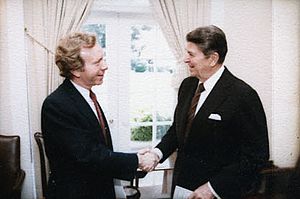

In 1970, Lieberman was elected to the Connecticut State Senate. He served there for 10 years. For six of those years, he was the Majority Leader. In 1980, he lost a race for the U.S. House of Representatives.
From 1983 to 1989, he served as Connecticut Attorney General. In this role, he focused on protecting consumers and enforcing environmental laws. He even argued one case before the United States Supreme Court.
Serving in the U.S. Senate
Becoming a Senator
Lieberman was first elected to the United States Senate in 1988. He won by a small number of votes against the Republican Lowell Weicker. This was seen as a big surprise in politics that year. He was supported by Democrats and some Republicans who disagreed with Weicker.
After he was elected, a Senate leader advised him to focus on a few topics. Lieberman said that over his 24 years, politics became much more divided. This made it harder to get things done.
Lieberman also worked to address violence in video games. His efforts helped create the video game rating system we have today.
Re-election and Challenges
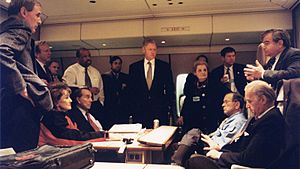
In 1994, Lieberman won his Senate re-election by a very large margin. He received 67% of the votes. From 1995 to 2001, he led the Democratic Leadership Council. This group focused on moderate Democratic ideas.
In 1998, Lieberman was the first major Democrat to criticize President Bill Clinton for his personal actions. However, he voted against removing Clinton from office. In 2000, he was re-elected to the Senate for a third term.
Running for Vice President
In August 2000, Vice President Al Gore chose Lieberman as his running mate for president. This made Lieberman the first Jewish person to run for the second-highest office in the U.S.
The Gore-Lieberman team won more votes from the public. But they lost the election in the Electoral College to George W. Bush and Dick Cheney. The election was very close and decided by a Supreme Court ruling.
2006 Senate Election
In 2006, Lieberman wanted to be re-nominated by the Democratic Party for his Senate seat. But he lost the primary election to Ned Lamont, who was more against the war in Iraq.
Lieberman then decided to run as an independent candidate. He created a new party called Connecticut for Lieberman. He said his loyalty to his state and country was greater than his loyalty to his party. Even though he lost the Democratic primary, he won the general election in November 2006. He got 50% of the vote. Many Republicans and independent voters supported him.
After this, he was listed as an Independent Democrat in the Senate. He continued to work with the Democratic Party.
Homeland Security and Other Work
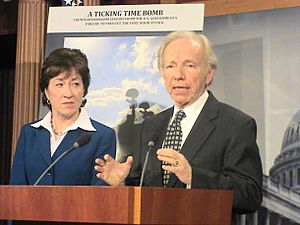
Lieberman became Chairman of the Governmental Affairs Committee in 2001. He was a strong supporter of creating the Department of Homeland Security (DHS). He suggested bringing together agencies like FEMA, the U.S. Customs Service, and the U.S. Border Patrol under this new department. This idea became law in 2002.
He also worked with Senator Susan Collins to improve FEMA. They wanted FEMA to be better at preparing for and responding to disasters. This new law passed in 2006. Lieberman also held hearings on the H1N1 influenza (swine flu) pandemic in 2009. He pushed for faster distribution of vaccines.
As Chairman of the Homeland Security and Governmental Affairs Committee, he worked to make the government more efficient. He was also a member of other important committees.
Committee Assignments
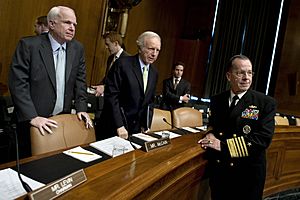
- Committee on Armed Services
- Committee on Homeland Security and Governmental Affairs (Chairman)
- Committee on Small Business and Entrepreneurship
- Committee on Environment and Public Works
Presidential Election Involvement
2004 Presidential Campaign
In 2003, Lieberman announced he would run for president in 2004. He hoped his strong stance on national security would appeal to voters. However, he did not win any primary elections. He withdrew from the race in February 2004. He later said his support for the Iraq War was a big reason he lost support from many Democratic voters.
Supporting John McCain in 2008
In 2007, Lieberman supported Republican Senator John McCain for president. This was unusual because Lieberman was a Democrat. He said he agreed with McCain on the "War on Terrorism."
Lieberman spoke at the 2008 Republican National Convention to support McCain. He was even considered as a possible Vice President for McCain. Many Democrats were upset by his support for a Republican. But the Senate Democratic Caucus voted to let him keep his committee chairmanship. President-elect Barack Obama privately asked Democratic leaders not to remove Lieberman from his position.
Political Views

Lieberman was a strong supporter of the Iraq War. He also strongly supported the relationship between the U.S. and Israel. On issues within the U.S., he supported free trade. He also often voted for laws that helped trade unions.
He described himself as a "genuinely an Independent." He said he often agreed with Democrats on issues inside the country. But he often agreed with Republicans on foreign and defense policy.
Lieberman was a leading voice in ending the "Don't ask, don't tell" policy. This policy prevented gay and lesbian people from serving openly in the U.S. military. He also supported the rights of gay and lesbian people to adopt children. He also supported laws to protect them from hate crimes.
During discussions about the Affordable Care Act, Lieberman opposed a "public option" for health insurance. His opposition was important because his vote was needed to pass the law. This led to the public option being removed from the final bill.
Life After the Senate
In 2011, Lieberman announced he would retire from the Senate. His last term ended in 2013. He was succeeded by Chris Murphy.
After retiring, Lieberman became a senior lawyer at a law firm in New York City. He also joined a conservative think tank. He taught a political science course at Yeshiva University.
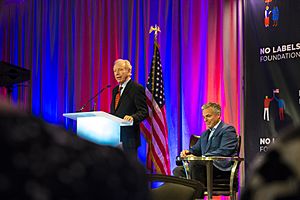
In 2015, Lieberman co-chaired a group called the Blue Ribbon Study Panel on Biodefense. This group looked at how the U.S. could better protect itself from biological threats. They suggested many changes to U.S. policy.
He also became chairman of United Against Nuclear Iran (UANI). This group works to prevent Iran from developing nuclear weapons. In 2016, he joined the Muslim-Jewish Advisory Council. This group works to fight anti-Muslim and anti-Jewish hatred in the U.S.
In 2017, Lieberman was interviewed by President Donald Trump for the job of FBI Director. However, he later withdrew his name from consideration.
Personal Life and Family
Lieberman met his first wife, Betty Haas, while they were college interns. They married in 1965 and had two children, Matt and Rebecca. They divorced in 1981.
In 1982, he married Hadassah Freilich Tucker. Her parents were Holocaust survivors. Joe and Hadassah had a daughter, Hana. Lieberman also had a stepson, Ethan Tucker.
Lieberman described himself as an "observant" Jew. He and Hadassah kept a kosher home and observed the Sabbath. He believed that faith had a place in public life. He attended several synagogues. He was the first Jewish person to run on a major party presidential ticket.
Joe Lieberman died on March 27, 2024, at age 82. He passed away from injuries after a fall at his home. Many political leaders shared tributes to him.
Awards and Recognition
In 2008, Lieberman received the U.S. Senator John Heinz Award. This award recognizes great public service by elected officials.
In 2011, the National Defense University honored Senators Lieberman and John McCain. They received the American Patriot Award for their service to America's national security and armed forces.
Published Books
Lieberman wrote seven books. These included:
- The Power Broker (1966), a biography of a Democratic Party leader.
- The Scorpion and the Tarantula (1970), about efforts to control nuclear weapons.
- The Legacy (1981), a history of Connecticut politics.
- Child Support in America (1986), a guide on collecting child support.
- In Praise of Public Life (2000).
- An Amazing Adventure (2003), about his 2000 vice presidential campaign.
- The Gift of Rest: Rediscovering the Beauty of the Sabbath (2011).
Images for kids
See also
 In Spanish: Joe Lieberman para niños
In Spanish: Joe Lieberman para niños
- Conservative Democrat
- List of Jewish members of the United States Congress
- List of United States senators who switched parties
 | Laphonza Butler |
 | Daisy Bates |
 | Elizabeth Piper Ensley |



